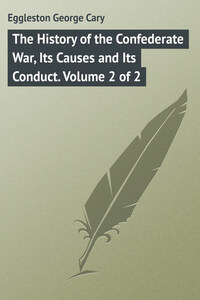CHAPTER XXXI
The Struggle for Emancipation
In the meantime great events were occurring which were in some respects more important in their bearing on the war than battles would have been. In these events the war recognized itself and adapted itself to its conditions.
From the beginning the abolitionists had clamorously and ceaselessly demanded of Mr. Lincoln that he should recognize the actual cause of the war by proclaiming freedom for the slaves at the South. There was no doubt in anybody's mind that the war was simply the culmination of that "irrepressible conflict" between the systems and sentiments of free and slave labor which had constituted the burden of the country's history for nearly half a century. If there had been no slavery there would have been no war.
It is true that a very large proportion of the Southern people regretted slavery, deprecated its existence, and earnestly desired to be rid of it. It is also true that the great mass of the Southerners were non-slaveholders, and that their fighting was done not for the perpetuation of that institution, in which they had no interest, but in assertion of those reserved rights of the individual states upon the maintenance of which they sincerely believed that the liberty of the people depended. These people desired to take their states out of the Union, not for the sake of slavery, but for the sake of that right of local self-government which they regarded as the fundamental condition of liberty among men.
On the other hand a large proportion of the Northern people cared little or nothing about slavery – many of them even approving the institution as the only practicable arrangement under which blacks and whites could live peaceably together, and as a condition eminently proper for the incapable black man. But these believed in the maintenance of the Union as a condition of liberty and progress, and were ready to sacrifice their lives and their possessions in behalf of that end.
Nevertheless it was clear from the beginning that in the last analysis, the war involved as its issue the maintenance of slavery, or the destruction of that system root and branch.
Personally Mr. Lincoln hated slavery and very earnestly desired its extermination. But, as he reminded those who beset him with unsolicited advice, he was restrained by his oath of office while they were free to advocate any principle or policy that might seem good in their eyes.
Moreover, he had upon him the tremendous task of preserving the Union and in aid of that supreme purpose he was ready to sacrifice all other considerations of what kind soever. In answer to an impassioned appeal from Horace Greeley in August, 1862, Mr. Lincoln set forth his attitude in these words:
"My paramount object is to save the Union, and not either to save or destroy slavery. If I could save the Union without freeing any slave, I would do it. If I could save it by freeing all the slaves, I would do it. And if I could do it by freeing some and leaving others alone, I would also do that."
At the beginning Mr. Lincoln had clearly seen the necessity of winning all the support he could to his war measures. He had seen that while practically the whole population of the North would stand by him in a war for the preservation of the Union, there must be a very great and dangerous defection, should he make the war one for the extirpation of slavery in those states in which the institution existed under protection of the Federal Constitution. By thus resolutely refusing to make the war a crusade against slavery, and declaring – as he did in his official utterances – that it was no part of his purpose to interfere with the domestic institutions of any state, Mr. Lincoln had drawn to his support a vast body of influential citizens who would otherwise have opposed, and whose influence was great enough perhaps, if it had been offended, to have robbed him of the means of restoring the disrupted Union. Had he adopted the policy of the extremists at the North, had he begun by declaring war upon slavery rather than upon disunion, there is little doubt that Maryland, Kentucky and the whole strength of Missouri would have been thrown into the Confederate side of the scale with disastrous effect. Even New York, the financially and otherwise dominant Northern state, would have given him at best only a divided and ineffective allegiance, while in all the other states of the North, heavy minorities, and in some cases perhaps commanding majorities, would have opposed his measures and deprived him of that support in Congress and the country upon which depended his success in his effort to restore and perpetuate the Union.
By his policy of waging war at the outset only for the salvation of the nation's integrity he won to his measures the support of hundreds of thousands whose antagonism, or whose dissatisfied inactivity, would have threatened the National arms with defeat and disaster. So far-reaching indeed was the effect of his wiser policy that it gave to the country in its hour of sorest need the services of the great War Minister, Edwin M. Stanton, with all that his inclusion in the cabinet implied.














